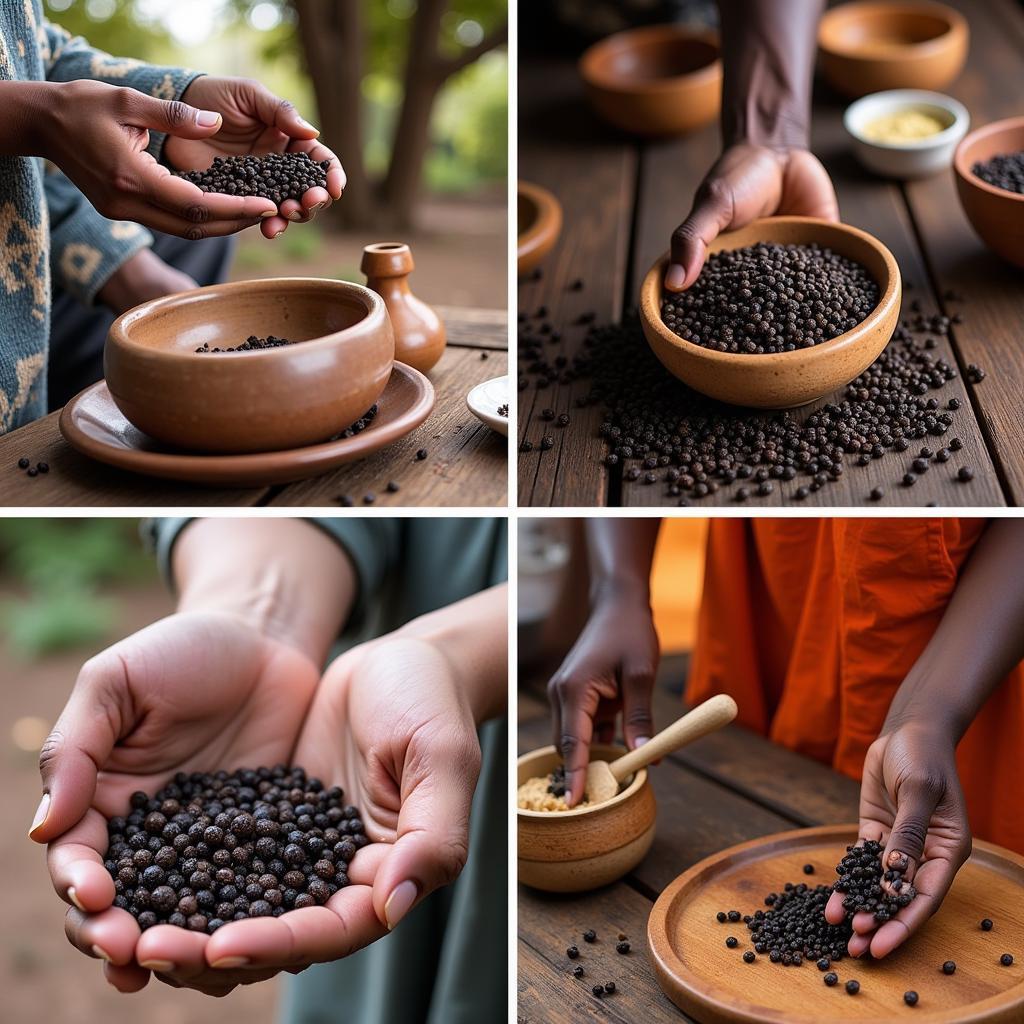Unveiling the Power of African Black Pepper
African Black Pepper, a spice often overlooked in favor of its Asian counterpart, boasts a unique flavor profile and rich history deeply intertwined with the African continent. From its ancient origins to its modern culinary applications, this spice offers a world of flavor waiting to be explored. Let’s delve into the fascinating story of African black pepper.
A Spice with Deep Roots: The Origins of African Black Pepper
Unlike the Piper nigrum (black pepper) commonly found in kitchens worldwide, African black pepper encompasses several indigenous species from the Piper genus, such as Piper guineense and Ashanti pepper. These West African varieties possess a distinct peppery flavor with hints of citrus and warmth, setting them apart from the more pungent Asian black pepper. Historically, these spices played a crucial role in West African trade routes, often exchanged for gold, salt, and other valuable commodities. African black pepper was also highly valued for its medicinal properties, used in traditional remedies for various ailments. african food on a stick provides an interesting insight into the broader culinary uses of various spices and ingredients across the continent.
What Makes African Black Pepper Unique?
African black pepper’s unique flavor profile stems from its terroir and the specific species of the Piper plant. The warm, humid climates of West Africa contribute to the development of complex aromatic compounds, resulting in a spice with a robust yet nuanced flavor. While still delivering a peppery kick, African black pepper also offers subtle notes of citrus, camphor, and even a hint of nutmeg. This makes it a versatile ingredient that can enhance both sweet and savory dishes.
Culinary Adventures: Using African Black Pepper in Your Kitchen
 Culinary Uses of African Black Pepper: A display of various dishes seasoned with African black pepper, highlighting its versatility in both traditional African cuisine and modern fusion dishes.
Culinary Uses of African Black Pepper: A display of various dishes seasoned with African black pepper, highlighting its versatility in both traditional African cuisine and modern fusion dishes.
African black pepper is more than just a spice; it’s a gateway to exploring the rich culinary heritage of Africa. This versatile ingredient can elevate everyday dishes and add a unique twist to classic recipes. From savory stews and grilled meats to vibrant sauces and marinades, African black pepper’s distinct flavor profile complements a wide range of ingredients. You can also use it to season vegetables, add depth to soups, or even create unique spice blends for rubs and marinades. Consider experimenting with african and middle eastern spices to create unique flavor combinations.
How to Use African Black Pepper
- Whole peppercorns: Ideal for slow-cooked dishes and stews, allowing the flavor to infuse over time.
- Ground pepper: Perfect for adding a quick burst of flavor to sauces, marinades, and dry rubs.
- Spice blends: Combine with other spices like ginger, turmeric, and coriander to create unique flavor profiles.
Beyond the Kitchen: The Cultural Significance of African Black Pepper
 Cultural Significance of African Black Pepper: Images depicting traditional African ceremonies and rituals where African black pepper is used symbolically or medicinally.
Cultural Significance of African Black Pepper: Images depicting traditional African ceremonies and rituals where African black pepper is used symbolically or medicinally.
African black pepper holds a significant place in many West African cultures. Beyond its culinary uses, this spice has been traditionally used in medicinal practices, religious ceremonies, and even as a form of currency. Its historical importance as a trade commodity further underscores its cultural value, connecting communities and shaping the region’s economic landscape. Much like the traditional ingredients used in african chicken and collard greens, African black pepper represents a vital part of the continent’s culinary heritage.
Dr. Aminata Sow, a renowned ethnobotanist specializing in West African flora, notes, “African black pepper is more than just a spice; it’s a symbol of cultural heritage, resilience, and the interconnectedness of people and nature.”
Preserving the Legacy: Sustainable Practices and the Future of African Black Pepper
The growing interest in African black pepper presents an opportunity to support sustainable farming practices and empower local communities. By sourcing this spice ethically and promoting its unique qualities, we can help preserve its cultural legacy and ensure its future for generations to come. Just as with the handcrafted tradition of african black soap body wash diy, supporting sustainable practices ensures the continuation of valuable cultural knowledge.
Professor Kwame Nkrumah, an expert in agricultural economics, explains, “Investing in sustainable African black pepper farming not only preserves biodiversity but also creates economic opportunities for local communities and promotes cultural preservation.”
In conclusion, African black pepper is a treasure trove of flavor and cultural significance. From its ancient origins in West Africa to its modern culinary applications, this spice offers a unique and enriching experience. By exploring the diverse uses of African black pepper, we can celebrate the rich culinary heritage of Africa while supporting sustainable practices that benefit both people and the planet.
FAQ
- What is the difference between African black pepper and regular black pepper? African black pepper refers to species like Piper guineense, offering a different flavor profile than the common Piper nigrum.
- Where can I buy African black pepper? Specialty spice shops and online retailers are good places to start.
- How should I store African black pepper? Store in an airtight container in a cool, dark place to preserve its flavor and aroma.
- What are some common dishes that use African black pepper? Stews, grilled meats, sauces, and marinades are all excellent choices.
- Can I use African black pepper in place of regular black pepper? Yes, but keep in mind the flavor difference. Start with a smaller amount and adjust to taste.
- Is African black pepper spicy? It has a peppery kick, but it’s often described as more complex and nuanced than regular black pepper.
- What are the health benefits of African black pepper? It’s traditionally used for its antioxidant and anti-inflammatory properties.
Situations Where African Black Pepper Answers the Need
- Seeking unique flavors: If you are tired of the same old spices and are looking to add some excitement to your cooking, African black pepper offers a distinct and complex flavor profile.
- Exploring African cuisine: African black pepper is an essential ingredient in many traditional dishes, providing an authentic taste of the continent’s culinary heritage.
- Supporting sustainable practices: Purchasing ethically sourced African black pepper helps support local communities and sustainable farming methods.
- Adding a healthy twist: With its potential health benefits, African black pepper is a flavorful and healthful addition to your diet.
Other Related Questions and Articles
You might also be interested in learning more about african american soul food recipes, which often incorporate various spices and seasonings.
Contact Us
For further assistance or to learn more about African Black Pepper, please contact us:
Phone: +255768904061
Email: kaka.mag@gmail.com
Address: Mbarali DC Mawindi, Kangaga, Tanzania.
We have a 24/7 customer service team ready to assist you.

